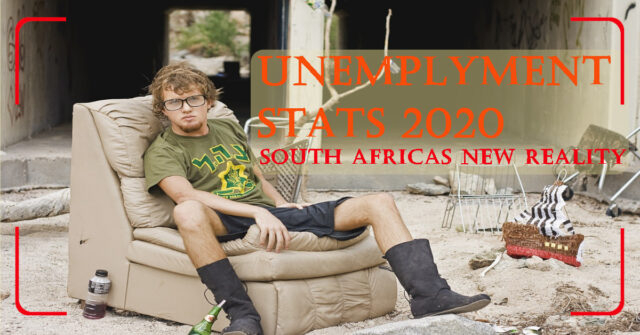Well, Stats SA has just recently released the updated unemployment figures for South Africa. I think it comes as no surprise that the unemployment percentage has increased. This was predicted very early on in 2020 when the idea of a lockdown was just being discussed. Unfortunately, and this is just a personal opinion, our government decided that the livelihoods of the public were less important than preventing the spread of COVID19.
Now I know everyone has a different opinion about this, but I am confident that if you are in support of the lockdown, even with the knowledge that millions of South Africans will go hungry because they are unable to generate an income, then you are not one of the millions that have lost their jobs or will lose their jobs. I could rant on and on about this, and believe me even the fortunate few that think they have escaped the wrath of the ANC lockdown will soon experience the side effects. These will come from the increased crime rates, the increased taxes, and everything in-between. Don’t believe me? Wait and see.
Anyway. Enough with the doom and gloom, let’s have a look at the number and you can then make up your own minds. Remember, I always love hearing back from you. So, if you have an opinion on the subject please let me know in the comments below.
Unemployment in South Africa 2020
South Africa’s unemployment rate reached a record high of 30.8% in the third quarter of 2020, Statistics South Africa announced on Thursday [November 12]. The figures are much higher than in quarter two and perhaps provide a clearer picture of how the national lockdown has affected jobs in the country.
The unemployment rate of 30.8% is the highest figure recorded in the country since the start of the Quarterly Labour Force Survey (QLFS) in 2008.
Stats SA only classifies people as unemployed if they are actively seeking employment, which means that in Q2 [April to June] the unemployment figures were distorted and artificially low at 23.3%, according to Reuters.
“Indeed the 30.8% is the highest we have recorded,” said Risenga Maluleka, the Statistician-General at a press conference. “What has actually lifted the unemployment rate?… it’s largely the number of people who were seated [without work], and had reasons relating to COVID in the main, who came out and started to actively look for employment.”
Stats SA says that there were significant movements in the country’s labour market during Q3. Many people moved from the “other not economically active” category to “employed” and “unemployed” status between quarter two and quarter three of 2020, according to the QLFS.

“The movement was proportionately more towards the unemployed than for the employed, which resulted in a significant increase of 7.5 percentage points in the unemployment rate to 30.8%,” said Stats SA.
The number of people employed in the country increased by 543 000 to 14.7-million in Q3 and the number of unemployed people increased by 2.2-million to 6.5-million compared to Q2 of 2020. Altogether, this means that an additional 2.8-million people have been added to the nation’s labour force.
“In spite of the increase in the number of discouraged work-seekers (up by 9.1%), the number of people who were not economically active for reasons other than discouragement decreased by 2.9-million between the two quarters, resulting in a net decrease of 2.6-million in the not economically active population,” said the statistics agency.

The unemployment rate according to the expanded definition — which includes discouraged workers and those not actively seeking employment — is now 43.1%, an increase of 1.1 percentage points in comparison to Q2.
There was an increase in employment across all sectors in Q3:
- The formal employment sector increased by 242 000 jobs (2.4%).
- The informal sector increased by 176 000 jobs (7.7%).
- Private households increased by 116 000 jobs (11.5%).
- Agriculture increased by 9000 jobs (1.1%).
Most job losses were recorded in the following industries:
- Trade shed 400 000 jobs
- Manufacturing lost 300 000 jobs.
- Community and social services lost 298 000 jobs
- Construction lost 259 000 jobs.
Source:
https://www.capetownetc.com
LEGAL CONTENT DISCLAIMER
The information contained on this website is simply aimed at providing readers with guidance on labour law in South Africa. This information has not been provided to meet the individual requirements of a specific individual. Bizcraft will always suggest that legal advice be obtained to address a person’s unique circumstances. It is important to remember that the law is constantly changing and although Bizcraft strives to keep the information up to date and of high quality, it cannot be guaranteed that the information will be updated and/or be without errors or omissions. As a result, Bizcraft will under no circumstances accept liability or be held liable, for any innocent or negligent actions or omissions which may result in any harm or liability flowing from the use of or the inability to use the information provided.




